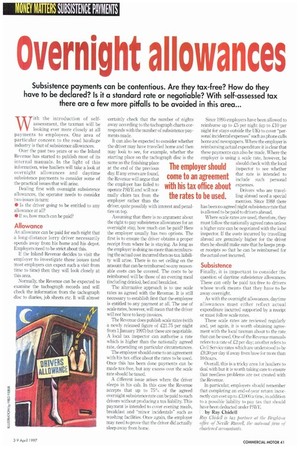Overnight allowances
Page 43

If you've noticed an error in this article please click here to report it so we can fix it.
With the introduction of selfassessment, the taxman will be looking ever more closely at all payments to employees. One area of particular concern to the road haulage industry is that of subsistence allowances.
Over the past two years or so the Inland Revenue has started to publish most of its internal manuals. In the light of this information, wise hauliers will take a look at overnight allowances and daytime subsistence payments to consider some of the practical issues that will arise.
Dealing first with overnight subsistence allowances, the operator needs to consider two issues in turn: • Is the driver going to be entitled to any allowance at all?
• If so, how much can be paid?
Allowance
An allowance can be paid for each night that a long-distance lorry driver necessarily spends away from his home and his depot. Employers need to be strict about this.
If the Inland Revenue decides to visit the employer to investigate these issues (and most employers can expect such a visit from time to time) then they will look closely at this area.
Normally, the Revenue can be expected to examine the tachograph records and will check the information from the tachograph disc to diaries, job sheets etc. It will almost certainly check that the number of nights away according to the tachograph charts corresponds with the number of subsistence payments made.
It can also be expected to consider whether the driver may have travelled home and then may look to see, for example, whether the starting place on the tachograph disc is the same as the finishing place at the end of the previous day. If any errors are found, the Revenue will argue that the employer has failed to operate PAYE and will normally claim tax from the employer rather than the driver, quite possibly with interest and penalties on top.
Assuming that there is no argument about the right to pay subsistence allowances for an overnight stay, how much can be paid? Here the employer usually has two options. The first is to ensure the driver obtains a proper receipt from where he is staying. As long as the employer is doing no more than reimbursing the actual cost incurred then no tax liability will arise. There is no set ceiling on the amount that can be reimbursed so any reasonable costs can be covered. The costs to be reimbursed will be those of an evening meal (including drinks), bed and breakfast.
The alternative approach is to use scale rates as agreed with the Revenue. It is still necessary to establish first that the employee is entitled to any payment at all. The use of scale rates, however, will mean that the driver will not have to keep invoices.
The Revenue does publish scale rates (with a newly released figure of £21.75 per night from 1 January 1997) but these are negotiable. A local tax inspector can authorise a rate which is higher than the nationally agreed rate, depending on particular circumstances.
The employer should come to an agreement with his tax office about the rates to be used. Once this has been done payments can be made tax-free, but any excess over the scale rate should be taxed.
A different issue arises where the driver sleeps in his cab. In this case the Revenue accepts that up to 75% of the agreed overnight subsistence rate can be paid to such drivers without producing a tax liability. This payment is intended to cover evening meals, breakfast and "minor incidentals" such as washing facilities, Once again, the employer may need to prove that the driver did actually sleep away from home. Since 1995 employers have been allowed to reimburse up to £5 per night (up to £10 per night for stays outside the UK) to cover "personal incidental expenses" such as phone calls home and newspapers. Where the employer is reimbursing actual expenditure it is clear that these payments can also be made. Where the employer is using a scale rate, however, he should check with the local inspector to see whether that rate is intended to include such personal expenses.
Drivers who are travelling abroad need a special mention. Since 1988 there has been no agreed night subsistence rate that is allowed to be paid to drivers abroad.
Where scale rates are used, therefore, they must follow the nationally agreed rates unless a higher rate can be negotiated with the local inspector. If the costs incurred by travelling abroad are genuinely higher for the driver then he should make sure that he keeps proper receipts so that he can be reimbursed for the actual cost incurred.
Subsistence
Finally, it is important to consider the question of daytime subsistence allowances. These can only be paid tax-free to drivers whose work means that they have to be away overnight.
As with the overnight allowances, daytime allowances must either reflect actual expenditure incurred supported by a receipt or must follow scale rates.
These scale rates are reviewed regularly and, yet again, it is worth obtaining agreement with the local taxman about to the rate that can be used. One of the Revenue manuals refers to a rate of .C2 per day: another refers to Civil Service rates which are understood to be .C9.30 per day if away from base for more than It) hours.
Overall, this is a tricky area for hauliers to deal with but it is worth taking care to ensure that needless problems are not created with the Revenue.
In particular, employers should remember that completing an end-of-year return incorrectly can cost up tol..3,0( X ) a time, in addition to a possible liability to pay tax that should have been deducted under PAYE by Ray Chidell
Ray aidell is lax politer al Ihe Reighlrat office qf Neville Russell. the aalimial jrm Qi dull-freed acmunlanls.




































































































